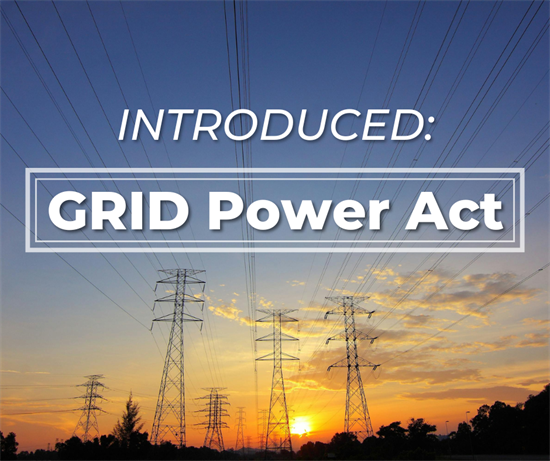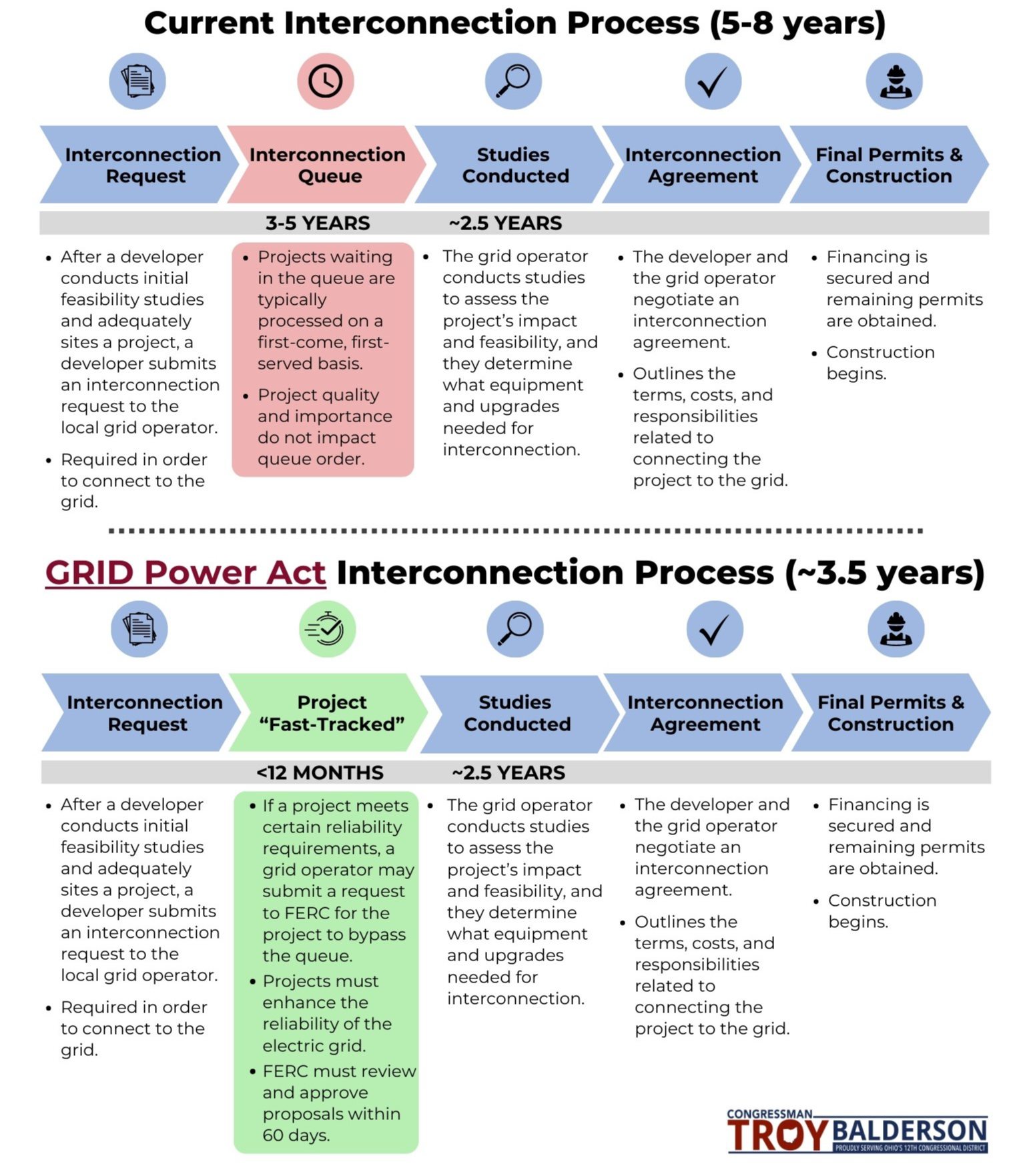WASHINGTON, D.C. – Congressman Troy Balderson (OH-12) introduced legislation today that would enable grid operators to fast-track consideration of power generation projects that improve the reliability of the electric grid.
The Guaranteeing Reliability through the Interconnection of Dispatchable (GRID) Power Act would allow certain projects, at the request of the grid operator, to bypass the overwhelmed interconnection queue. The queue is where proposed projects wait before grid operators begin conducting their feasibility and system impact studies. In 2023, the median wait time grew to five years, delaying critical projects from being built and connected to the grid.
“Our interconnection queue is buckling under its own weight,” said Balderson. “Transmission providers are tasked with ensuring we have enough electricity to keep the lights on, but the growing backlog of projects is adding years to an already time-consuming process. This legislation would give grid operators the authority to identify and expedite the consideration of essential projects that will protect our grid’s reliability and provide the power needed to meet America’s growing demand.”
The interconnection queue has become inundated with proposed projects seeking to capitalize on the Biden-Harris Administration’s taxpayer-funded subsidies for "green" energy. These weather-dependent, renewable projects, which now make up 97% of all projects in the queue, cannot be dispatched at a moment’s notice to meet consumers' day-to-day and hour-to-hour energy needs. As power demand in Ohio and across the nation grows at a historic pace, the grid will require more dispatchable baseload energy to avoid rolling blackouts and power shortages.
New federal rules, such as the Clean Power Plan 2.0, are accelerating the retirement of American power plants currently responsible for providing much of the United States’ baseload power. The GRID Power Act would bring more baseload power generation online in a timely manner, leading to the long-term stability of the American electric grid.
“EPSA commends Congressman Balderson for his continued leadership on electric grid reliability,” said Todd Snitcher, President & CEO of the Electric Power Supply Association (EPSA). “EPSA is a staunch supporter of the benefits of competitive markets; however, no economic model or structure can overcome inefficiencies in the interconnection process that can significantly delay critical investment in new dispatchable generation. This legislation appropriately creates a process that recognizes when reliability concerns require that certain investments be prioritized in the interconnection queue. The proposal is designed to recognize when reliability may be at risk and respond in a prudent and targeted manner. EPSA thanks Congressman Balderson and looks forward to supporting this effort.”
“Demand for electricity is growing at a pace our nation hasn’t seen in decades,” said American Electric Power (AEP). “AEP alone has requests from large customers that would more than double the peak demand we serve on our system today. Ensuring we are able to reliably serve new and existing customers will require us to rapidly expand our power generation fleet and grid capabilities. AEP supports Rep. Balderson’s efforts to improve and streamline the generator interconnection process.”
“OOGA stands with Congressman Balderson as he works to bring common sense solutions to a real problem facing Ohio and the rest of the PJM footprint,” said Rob Brundrett, President of the Ohio Oil and Gas Association (OOGA). Queue reform is important to energy producers and consumers alike by prioritizing abundant, reliable and easily dispatchable energy such as natural gas.”
“As the debate over generation adequacy continues within the 13-state grid region served by PJM Interconnection, Ohio manufacturers believe competitive markets will best respond to future load growth and demand,” said Ryan Augsburger, President of The Ohio Manufacturers’ Association (OMA). “OMA supports queue reform to more quickly and efficiently interconnect generating resources to the grid. Representative Balderson’s bill is a good first step toward reform.”
The GRID Power Act
The GRID Power Act directs the Federal Energy Regulatory Commission (FERC) to develop rules that authorize grid operators–Regional Transmission Organizations (RTOs) and Independent System Operators (ISOs)–to "fast-track" critical projects that ensure grid reliability and meet growing power demands by allowing them to bypass the years-long wait in the interconnection queue.
Under the legislation, grid operators would still be required to conduct feasibility and system impact studies on the generation projects before signing an interconnection agreement. The bill also promotes transparency by requiring the operators to provide a process for public comment and stakeholder engagement before submitting proposals to FERC and requires operators to provide regular reports on the state of grid reliability to FERC. This legislation empowers grid operators to accelerate projects that:
- Provide new dispatchable power and improve grid reliability and resource adequacy;
- Address power shortages caused by retiring or offline dispatchable power; and/or
- Support increased power demand.
FERC would be required to review and approve "fast-track" proposals within 60 days, potentially reducing the total time to approve these projects from years to just 12 months. Upon enactment, this legislation would require FERC to start the rulemaking process for this mechanism within 90 days of the bill's enactment and finalize the rules within 180 days.
Full text of the GRID Power Act can be found HERE.



